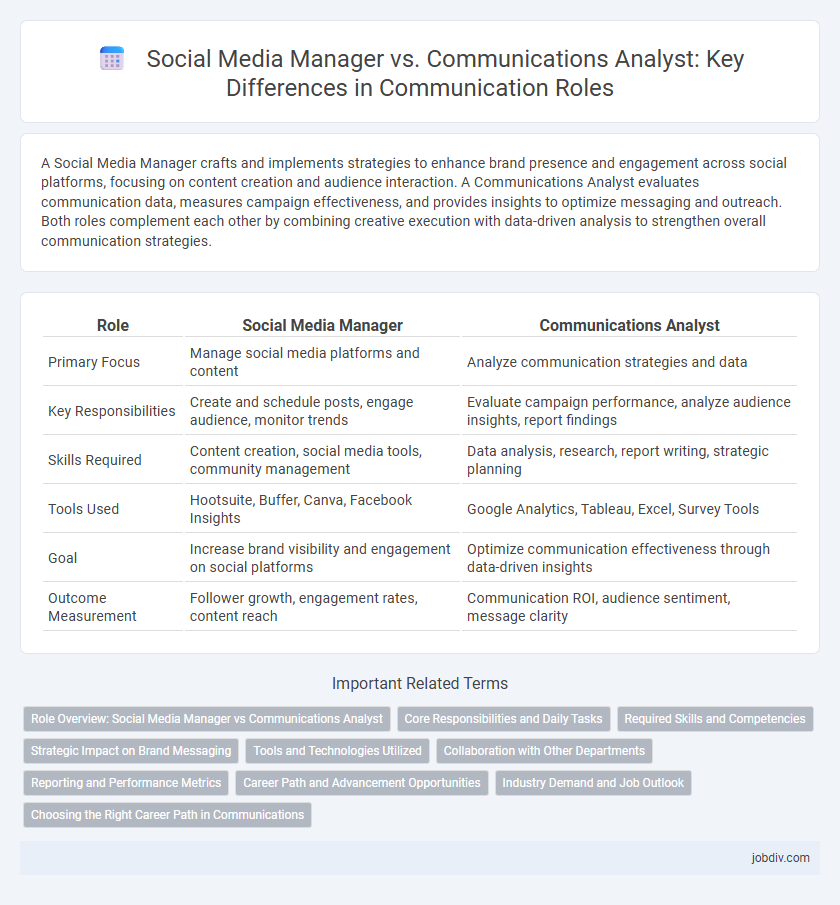A Social Media Manager crafts and implements strategies to enhance brand presence and engagement across social platforms, focusing on content creation and audience interaction. A Communications Analyst evaluates communication data, measures campaign effectiveness, and provides insights to optimize messaging and outreach. Both roles complement each other by combining creative execution with data-driven analysis to strengthen overall communication strategies.
Table of Comparison
| Role | Social Media Manager | Communications Analyst |
|---|---|---|
| Primary Focus | Manage social media platforms and content | Analyze communication strategies and data |
| Key Responsibilities | Create and schedule posts, engage audience, monitor trends | Evaluate campaign performance, analyze audience insights, report findings |
| Skills Required | Content creation, social media tools, community management | Data analysis, research, report writing, strategic planning |
| Tools Used | Hootsuite, Buffer, Canva, Facebook Insights | Google Analytics, Tableau, Excel, Survey Tools |
| Goal | Increase brand visibility and engagement on social platforms | Optimize communication effectiveness through data-driven insights |
| Outcome Measurement | Follower growth, engagement rates, content reach | Communication ROI, audience sentiment, message clarity |
Role Overview: Social Media Manager vs Communications Analyst
Social Media Managers develop and execute content strategies across platforms like Facebook, Instagram, and Twitter to enhance brand visibility and engage target audiences. Communications Analysts assess communication channels, analyze data trends, and measure campaign effectiveness to optimize messaging strategies. Both roles require expertise in digital communication tools, but Social Media Managers prioritize content creation while Communications Analysts focus on data-driven insights.
Core Responsibilities and Daily Tasks
A Social Media Manager oversees content creation, audience engagement, and campaign execution across platforms like Facebook, Instagram, and Twitter, ensuring brand consistency and growth in followers. A Communications Analyst focuses on data analysis, measuring communication effectiveness, conducting audience research, and providing insights to optimize messaging strategies. Both roles require collaboration with marketing and public relations teams but differ in tactical execution versus analytical evaluation.
Required Skills and Competencies
A Social Media Manager requires expertise in content creation, audience engagement, platform analytics, and brand management to drive online presence effectively. In contrast, a Communications Analyst focuses on data analysis, communication strategy evaluation, media monitoring, and reporting to optimize messaging impact. Both roles demand strong written and verbal communication skills but differ in emphasis on creative execution versus analytical assessment.
Strategic Impact on Brand Messaging
A Social Media Manager shapes brand messaging by curating content and engaging audiences across platforms, driving real-time interaction and brand visibility. In contrast, a Communications Analyst evaluates data trends and audience feedback to refine strategic messaging and optimize campaign effectiveness. Together, their roles ensure a cohesive, data-informed approach that strengthens brand identity and market positioning.
Tools and Technologies Utilized
Social Media Managers primarily utilize platforms like Hootsuite, Buffer, and Sprout Social to schedule content, analyze engagement metrics, and manage multiple social networks efficiently. Communications Analysts rely on advanced data analytics tools such as Google Analytics, Tableau, and sentiment analysis software to evaluate communication effectiveness and audience behavior. Both roles integrate CRM systems and content management tools, but their toolsets emphasize social media management versus data-driven communication strategy optimization.
Collaboration with Other Departments
A Social Media Manager collaborates closely with marketing, customer service, and product development teams to create cohesive brand messaging and drive engagement across platforms. Communications Analysts work with public relations, legal, and executive departments to analyze communication strategies, ensuring alignment with organizational goals and risk management. Both roles require cross-departmental collaboration to optimize information flow and enhance overall corporate communication effectiveness.
Reporting and Performance Metrics
Social Media Managers specialize in tracking engagement rates, follower growth, and campaign reach to optimize content strategies. Communications Analysts focus on analyzing performance metrics such as sentiment analysis, message penetration, and media impact to evaluate overall communication effectiveness. Both roles utilize data-driven reporting tools but differ in scope, with Social Media Managers targeting platform-specific metrics and Communications Analysts assessing broader organizational communication outcomes.
Career Path and Advancement Opportunities
A Social Media Manager typically advances through roles focused on digital marketing, content strategy, and brand engagement, eventually leading to senior positions such as Digital Marketing Director or Social Media Strategist. A Communications Analyst progresses by specializing in data-driven communication strategies, media analysis, and stakeholder engagement, often moving into roles like Communications Director or Corporate Communications Manager. Both career paths offer opportunities for leadership but emphasize different skills: creative content management for Social Media Managers and analytical communication expertise for Communications Analysts.
Industry Demand and Job Outlook
Social Media Managers are increasingly sought after in marketing and advertising sectors, with employment projected to grow by 13% over the next decade due to the surge in digital engagement across platforms. Communications Analysts, crucial in corporate and public relations industries, are experiencing steady demand driven by the need for data-driven strategies and reputation management, with a growth rate near 8%. Both roles benefit from the expanding digital landscape, but Social Media Managers face higher demand linked to direct audience engagement and content creation.
Choosing the Right Career Path in Communications
Choosing between a Social Media Manager and a Communications Analyst hinges on career goals and skill sets; Social Media Managers specialize in creating and executing digital marketing campaigns to boost brand engagement and follower growth across platforms like Instagram, Facebook, and Twitter. Communications Analysts focus on data-driven strategies, analyzing communication trends and metrics to optimize organizational messaging and stakeholder outreach. Prospective professionals should weigh their interest in creative content development versus analytical research to determine the ideal path in the communications field.
Social Media Manager vs Communications Analyst Infographic

 jobdiv.com
jobdiv.com